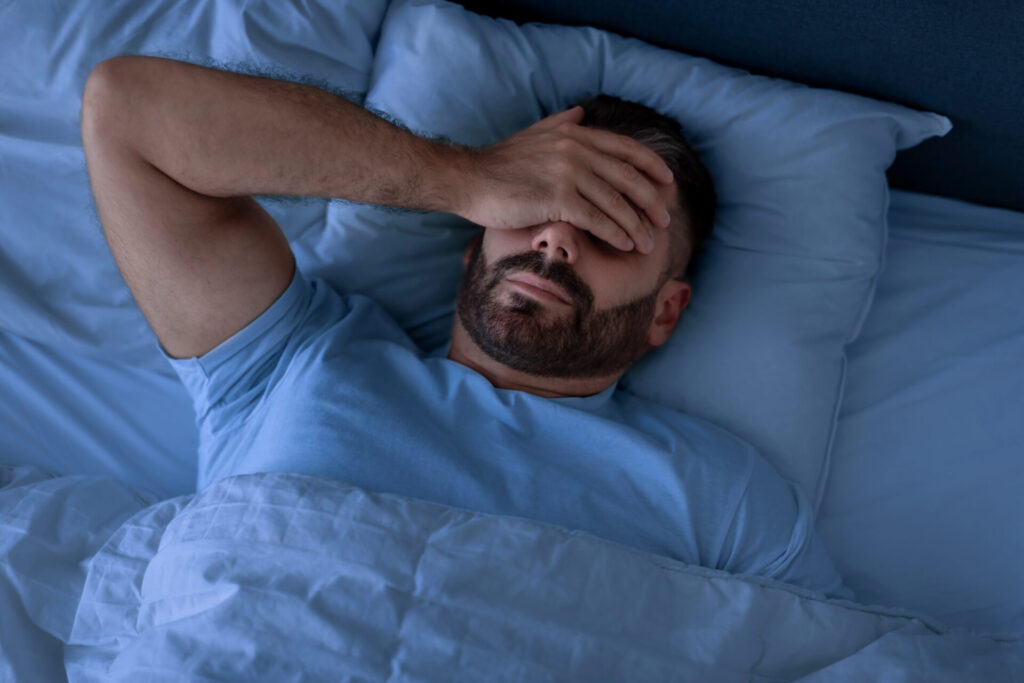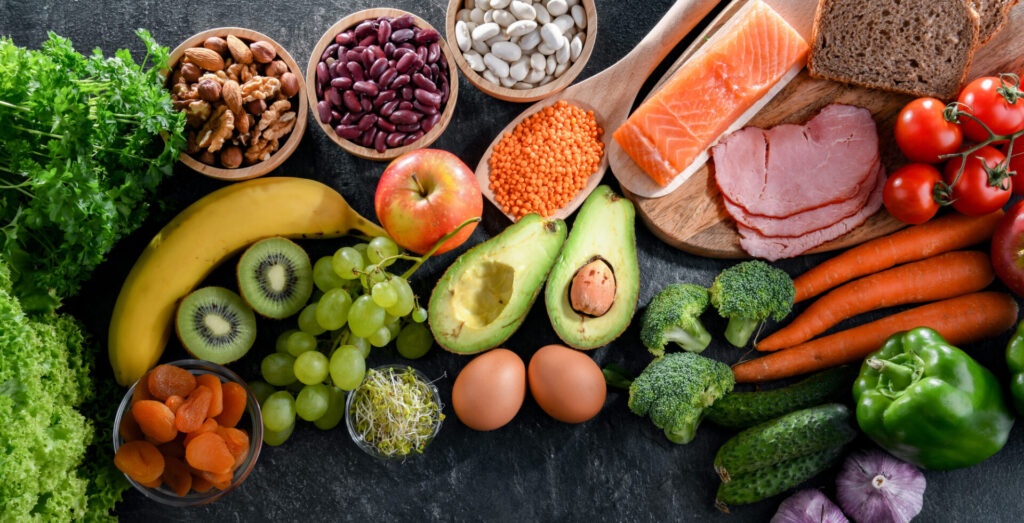We’ve heard a lot about the effects of sunlight deficiency on vitamin D production. Now researchers are starting to realize that people are also suffering from darkness deficiency due to an overexposure to artificial blue light from devices such as cell phones, computers, and television, as well as exposure to light at night due to shift work or staying up late. In the same way that sunlight deficiency leads to low vitamin D levels, darkness deficiency results in reduced melatonin secretion.1
In addition to exposure to light at night, another reason for low melatonin levels is aging, when levels of this important hormone fall, indicating that older adults are experiencing a double blow to their ability to enjoy RESTorative sleep. The drop in melatonin can start as early as a person’s late 20s.1
We spend one-third of our lives sleeping, which speaks to the importance of sleep in health, both mental and physical. Therefore, ensuring optimal levels of melatonin is critical to overall health. This article will discuss the importance of melatonin as well as two other complementary ingredients that can tackle the primary causes of sleep loss.
The Consequences of Low Melatonin
Recent evidence suggests that melatonin, through MT1 and MT2 receptors, might not only influence circadian aspects of sleep but likely, also regulate the homeostatic process of sleep and sleep architecture, or could be the molecule linking the homeostatic and circadian regulation of sleep.2
The drop in melatonin not only affects circadian rhythm and ability to sleep, it also casts a wide net on other areas of health. Melatonin is an antioxidant that’s important for immunity. It also promotes healthy brain aging.3 Although melatonin is produced in the pineal gland, there is 400 times more melatonin in the gut mucosa, suggesting melatonin levels may be a potential data point for gut health.4
Stress—Another Reason for Sleep Loss
Stress is another reason why patients are unable to obtain sufficient sleep as indicated by the link between cortisol and sleep quality.5 Lying in bed awake at night while stressing over life’s challenges is a common complaint of my patients. Consequently, I sought a solution to reduce stress in my patients while also supporting healthy melatonin levels for a healthy circadian rhythm and two non-psychotropic cannabinoids to ease patients’ stress.
We’ve already discussed the importance of melatonin and sleep earlier in this article, so let’s dive into how supporting the endocannabinoid system with cannabidiol (CBD) and β-caryophyllene can relieve stress and support healthy sleep.
Cannabidiol, Stress Reduction, and Sleep
CBD’s beneficial effects on the body are due to its impact on the endocannabinoid system, a pathway that is profoundly affected by stress and a person’s resilience to stress.6 Supplementing with a CBD that has enhanced bioavailability can nourish the endocannabinoid system and promote reduced stress and better sleep.
In one study, people who received 160 mg CBD slept more and awakened less during the night compared with the placebo.7 Researchers found similar results when investigating the effects of CBD in 103 patients.8 In this study, CBD improved sleep quality in 66.7% of participants.
Research in humans shows that CBD can soothe stress. For example, in a double-blind study, 57 healthy males were given oral CBD at doses of 150 mg, 300 mg, or 600 mg or a placebo prior to a public speaking test.9 Compared with the placebo, 300 mg of CBD caused a significant decline in stress during the speech. In another study, 600 mg of CBD before a public speaking test significantly reduced stress, cognitive impairment, and discomfort in speech performance.10
β-caryophyllene: Soothing Stress, Promoting Sleep
β-caryophyllene (BCP) is a dietary cannabinoid directly responsible for the activation of one of the two primary receptors in the endocannabinoid system. It is common in nature and found in many herbs, and it has FDA generally regarded as safe (GRAS) status.
Oils like lavender that contain BCP are usually known for their ability to support sleep duration. BCP has a soothing effect that can promote relaxation and sleep.11 Not only does BCP improve sleep, a 2025 review found that it reduces the cognitive impairment that can occur after sleep loss.12 BCP accomplishes this by regulating important factors involved in sleep-deprivation-induced cognitive impairment, such as supporting a healthy inflammatory response, reducing oxidative stress and neuronal death, and reduced neuroplasticity.
Conclusion
Sleep deprivation is common in our modern world due to exposure to blue light and stress overload. A trio of ingredients mentioned above leads to RESTorative sleep. Melatonin supports circadian rhythm while CBD and BCP soothe stress and promote sleep. Using these ingredients with enhanced absorption and bioavailability will get to work faster to help patients feel more relaxed and energized by a good night’s rest.
From The Sponsor: TruGen3
The Advantages of a Whole Hemp Extract
TruEase® PM contains a whole hemp extract providing CBD and BCP. This allows for synergy between the cannabinoids, which is known as the entourage effect. Thanks to the use of VESIsorb® technology, TruEase® PM also possesses superior bioavailability. VESIsorb® is a novel delivery system for CBD, BCP, and melatonin that significantly improves absorption.13,14 This means that patients have the means to fall asleep faster and stay asleep longer.
References
- Minich DM, Henning M, Darley C, Fahoum M, Schuler CB, Frame J. Is Melatonin the “Next Vitamin D”?: A Review of Emerging Science, Clinical Uses, Safety, and Dietary Supplements. Nutrients. 2022;14(19).
- Comai S, Gobbi G. Melatonin, Melatonin Receptors and Sleep: Moving Beyond Traditional Views. J Pineal Res. 2024;76(7):e13011.
- Bocheva G, Bakalov D, Iliev P, Tafradjiiska-Hadjiolova R. The Vital Role of Melatonin and Its Metabolites in the Neuroprotection and Retardation of Brain Aging. Int J Mol Sci. 2024;25(10).
- Chen CQ, Fichna J, Bashashati M, Li YY, Storr M. Distribution, function and physiological role of melatonin in the lower gut. World J Gastroenterol. 2011;17(34):3888-3898.
- De Nys L, Anderson K, Ofosu EF, Ryde GC, Connelly J, Whittaker AC. The effects of physical activity on cortisol and sleep: A systematic review and meta-analysis. Psychoneuroendocrinology. 2022;143:105843.
- Biener I, Mueller TT, Lin J, et al. Endocannabinoids, endocannabinoid-like compounds and cortisone in head hair of health care workers as markers of stress and resilience during the early COVID-19 pandemic. Transl Psychiatry. 2024;14(1):71.
- Carlini EA, Cunha JM. Hypnotic and antiepileptic effects of cannabidiol. J Clin Pharmacol. 1981;21(S1):417s-427s.
- Shannon S, Lewis N, Lee H, Hughes S. Cannabidiol in Anxiety and Sleep: A Large Case Series. Perm J. 2019;23:18-041.
- Linares IM, Zuardi AW, Pereira LC, et al. Cannabidiol presents an inverted U-shaped dose-response curve in a simulated public speaking test. Braz J Psychiatry. 2019;41(1):9-14.
- Bergamaschi MM, Queiroz RH, Chagas MH, et al. Cannabidiol reduces the anxiety induced by simulated public speaking in treatment-naïve social phobia patients. Neuropsychopharmacology. 2011;36(6):1219-1226.
- Galdino PM, Nascimento MV, Florentino IF, et al. The anxiolytic-like effect of an essential oil derived from Spiranthera odoratissima A. St. Hil. leaves and its major component, β-caryophyllene, in male mice. Prog Neuropsychopharmacol Biol Psychiatry. 2012;38(2):276-284.
- Lim CR, Ogawa S, Kumari Y. Exploring β-caryophyllene: a non-psychotropic cannabinoid’s potential in mitigating cognitive impairment induced by sleep deprivation. Arch Pharm Res. 2025;48(1):1-42.
- Knaub K, Sartorius T, Dharsono T, Wacker R, Wilhelm M, Schön C. A Novel Self-Emulsifying Drug Delivery System (SEDDS) Based on VESIsorb(®) Formulation Technology Improving the Oral Bioavailability of Cannabidiol in Healthy Subjects. Molecules. 2019;24(16).
- Mödinger Y, Knaub K, Dharsono T, et al. Enhanced Oral Bioavailability of β-Caryophyllene in Healthy Subjects Using the VESIsorb(®) Formulation Technology, a Novel Self-Emulsifying Drug Delivery System (SEDDS). Molecules. 2022;27(9).






